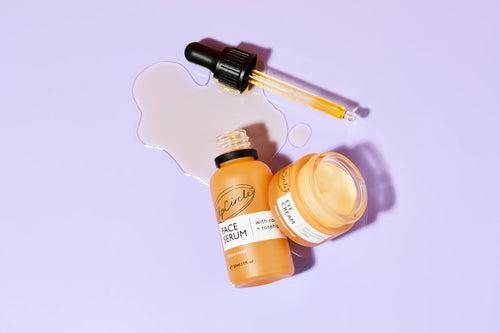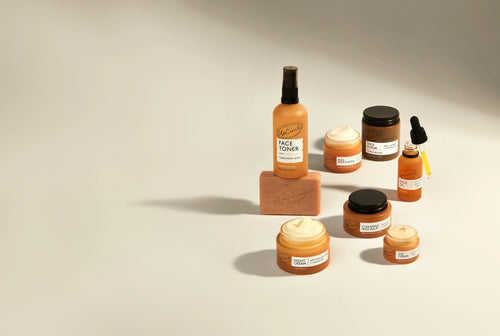Eco-friendly skincare and cosmetics are no longer niche – it’s a movement that’s gaining momentum. From claims of “cruelty-free” and “vegan”, to “organic” and “dermatologically tested”, eco certification labels are everywhere on product packaging. But do you know what they actually mean?
We’re decoding the labels to help you understand what you’re buying and the type of companies you’re funding, as well as how it got to the shelf. We’re here to help you make conscious decisions, so you can feel confident about the choices you’re making for your skin and the planet.
All about eco certifications
Eco-certifications act as official stamps of approval confirming a product has met specific environmental, ethical, or health-based standards. While there are several certifying bodies, the main aim is the same: helping consumers identify products that are genuinely planet-friendly.
We know that greenwashing is a growing problem, so these certifications help offer consumers some much-needed clarity and credibility. Here are some of the most well-known certifications:
Leaping Bunny (Cruelty Free International
The gold standard for cruelty-free beauty globally, the Cruelty Free International Leaping Bunny covers cosmetics, personal care and household products. You can search for brands to see if they are Leaping Bunny approved on their website.
This certification:
Checks for brands conducting, commissioning or being party to animal testing;
Requires a supplier monitoring system to be implemented by the brand;
Requires supply chain checking for animal testing right down to the ingredient manufacturer level;
Requires adherence to a fixed cut-off date policy; and
Acceptance of ongoing independent audits to ensure compliance.
It’s the only internationally recognizable programme to do this. At its core, the Leaping Bunny Programme ensures that there has been no animal testing at any stage of product development – including with ingredients and suppliers. The programme also ensures that brands commit to regular independent audits and ongoing compliance – meaning consumers know that the brand is consistently monitored.
B Corp
Benefit Corporation (B Corp) certification is a globally recognized standard for high social and environmental performance, accountability, and transparency standards. It's issued by non-profit organization B Lab, who assesses companies on what they sell and how they operate – hopefully ethically, sustainably, and responsibly!
B Corp is a holistic certification that doesn’t just focus on products, but on the entire business, from supply chains and worker treatment to carbon footprint and community impact.
Plastic negative
Plastic negative is a sustainability commitment where an organization or company removes twice as much plastic from the environment than it uses in its packaging or operations. It’s the next step beyond being “plastic neutral”, where a brand removes only as much as it produces, and it reflects a brand’s commitment to not only offset its plastic footprint, but to create a net positive impact on the planet.
For a beauty brand, being plastic negative means taking action beyond the product that makes it onto the shelf. It’s about investing in cleanup, supporting waste workers globally, and designing packaging with the planet in mind.
We've partnered with rePurpose Global to remove more ocean-bound plastic than we create as an entire business. At UpCircle, we prioritize glass packaging and reusable options, but where plastic is still necessary, we’ve chosen to offset more than we use, ensuring our impact is restorative, not just neutral.
Find out more about how Project Saaf Samudra ’clean sea’ works.
The Vegan Society Trademark
The Vegan Trademark is an internationally recognized vegan product certification, established by The Vegan Society. It’s standards are comprehensive – which gives consumers reassurance that a product is plant-based and cruelty-free.
Certified products need to include no animal-derived ingredients (including things like beeswax, lanolin, or carmine), and never use animal testing at any stage of production. They also need to ensure they use no genetically modified organisms (GMOs) involving animal genes or animal-derived substances.
This certification is one to look for if you’re a consumer wanting reassurance that products are completely cruelty-free, at every stage of production.
What else do we hear?
As well as hearing eco terminology such as “organic” and “vegan”, we also hear – and use – terms like “dermatologically-tested” and “natural”. “Dermatologically-tested” simply means tested on human skin; it does not mean the product is cruelty-free, organic, or safe for sensitive skin.
Our eco certifications
“Natural” has become the new “normal” – that's why we go a step further with our waste-fighting formulations. Every product in our range is formulated with upcycled ingredients. These ingredients are by-products from other industries, the food and drink industry in particular.

We believe that circular and by-product beauty will be the next step, and we’re proud to be pioneering that movement. We’re proudly vegan, cruelty-free, B-Corp, and plastic negative.
Explore our full range of natural skincare products and create a routine that works with and for your skin.








